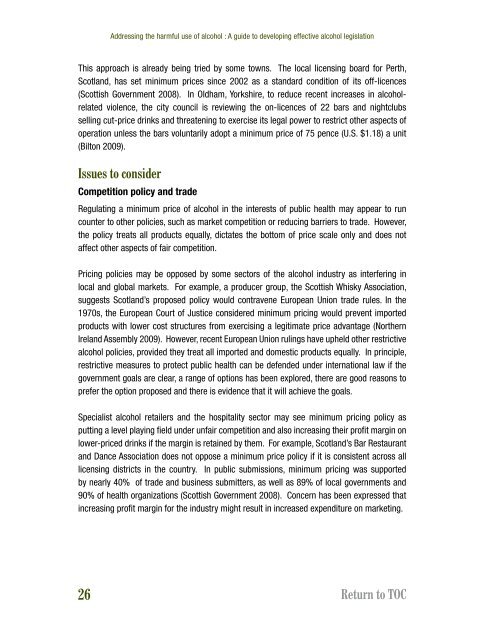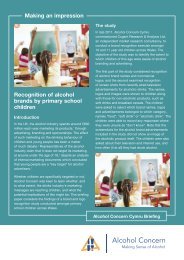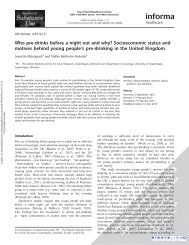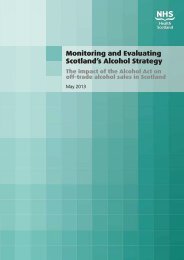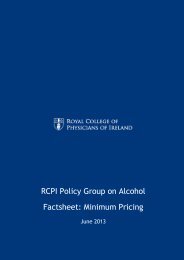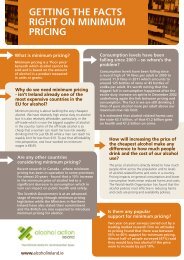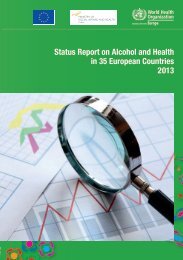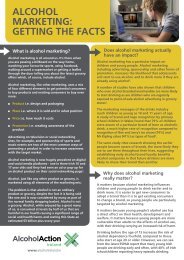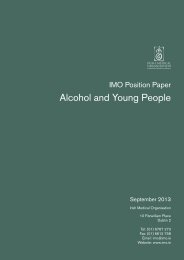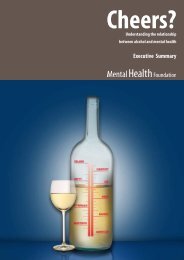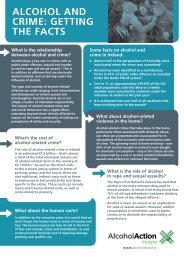Addressing the harmful use of alcohol - WHO Western Pacific Region
Addressing the harmful use of alcohol - WHO Western Pacific Region
Addressing the harmful use of alcohol - WHO Western Pacific Region
Create successful ePaper yourself
Turn your PDF publications into a flip-book with our unique Google optimized e-Paper software.
<strong>Addressing</strong> <strong>the</strong> <strong>harmful</strong> <strong>use</strong> <strong>of</strong> <strong>alcohol</strong> : A guide to developing effective <strong>alcohol</strong> legislation<br />
This approach is already being tried by some towns. The local licensing board for Perth,<br />
Scotland, has set minimum prices since 2002 as a standard condition <strong>of</strong> its <strong>of</strong>f-licences<br />
(Scottish Government 2008). In Oldham, Yorkshire, to reduce recent increases in <strong>alcohol</strong>related<br />
violence, <strong>the</strong> city council is reviewing <strong>the</strong> on-licences <strong>of</strong> 22 bars and nightclubs<br />
selling cut-price drinks and threatening to exercise its legal power to restrict o<strong>the</strong>r aspects <strong>of</strong><br />
operation unless <strong>the</strong> bars voluntarily adopt a minimum price <strong>of</strong> 75 pence (U.S. $1.18) a unit<br />
(Bilton 2009).<br />
Issues to consider<br />
Competition policy and trade<br />
Regulating a minimum price <strong>of</strong> <strong>alcohol</strong> in <strong>the</strong> interests <strong>of</strong> public health may appear to run<br />
counter to o<strong>the</strong>r policies, such as market competition or reducing barriers to trade. However,<br />
<strong>the</strong> policy treats all products equally, dictates <strong>the</strong> bottom <strong>of</strong> price scale only and does not<br />
affect o<strong>the</strong>r aspects <strong>of</strong> fair competition.<br />
Pricing policies may be opposed by some sectors <strong>of</strong> <strong>the</strong> <strong>alcohol</strong> industry as interfering in<br />
local and global markets. For example, a producer group, <strong>the</strong> Scottish Whisky Association,<br />
suggests Scotland’s proposed policy would contravene European Union trade rules. In <strong>the</strong><br />
1970s, <strong>the</strong> European Court <strong>of</strong> Justice considered minimum pricing would prevent imported<br />
products with lower cost structures from exercising a legitimate price advantage (Nor<strong>the</strong>rn<br />
Ireland Assembly 2009). However, recent European Union rulings have upheld o<strong>the</strong>r restrictive<br />
<strong>alcohol</strong> policies, provided <strong>the</strong>y treat all imported and domestic products equally. In principle,<br />
restrictive measures to protect public health can be defended under international law if <strong>the</strong><br />
government goals are clear, a range <strong>of</strong> options has been explored, <strong>the</strong>re are good reasons to<br />
prefer <strong>the</strong> option proposed and <strong>the</strong>re is evidence that it will achieve <strong>the</strong> goals.<br />
Specialist <strong>alcohol</strong> retailers and <strong>the</strong> hospitality sector may see minimum pricing policy as<br />
putting a level playing field under unfair competition and also increasing <strong>the</strong>ir pr<strong>of</strong>it margin on<br />
lower-priced drinks if <strong>the</strong> margin is retained by <strong>the</strong>m. For example, Scotland’s Bar Restaurant<br />
and Dance Association does not oppose a minimum price policy if it is consistent across all<br />
licensing districts in <strong>the</strong> country. In public submissions, minimum pricing was supported<br />
by nearly 40% <strong>of</strong> trade and business submitters, as well as 89% <strong>of</strong> local governments and<br />
90% <strong>of</strong> health organizations (Scottish Government 2008). Concern has been expressed that<br />
increasing pr<strong>of</strong>it margin for <strong>the</strong> industry might result in increased expenditure on marketing.<br />
26 Return to TOC


